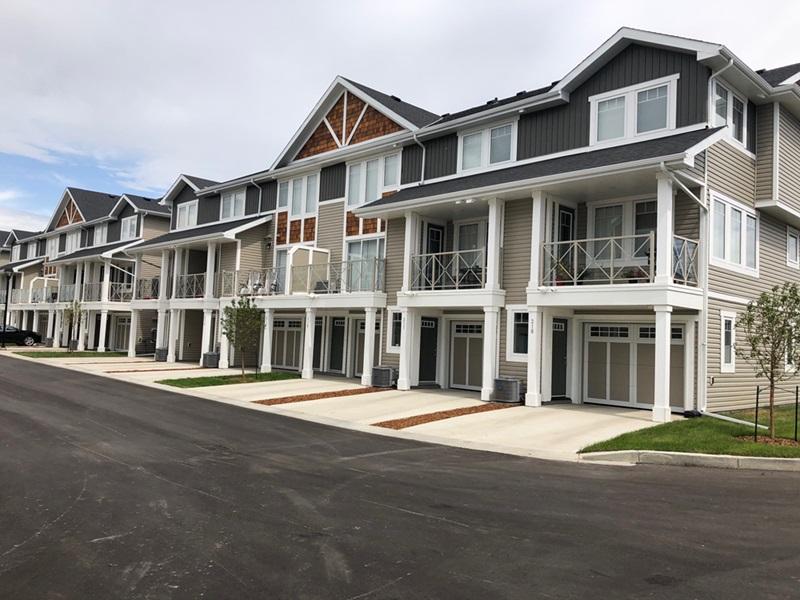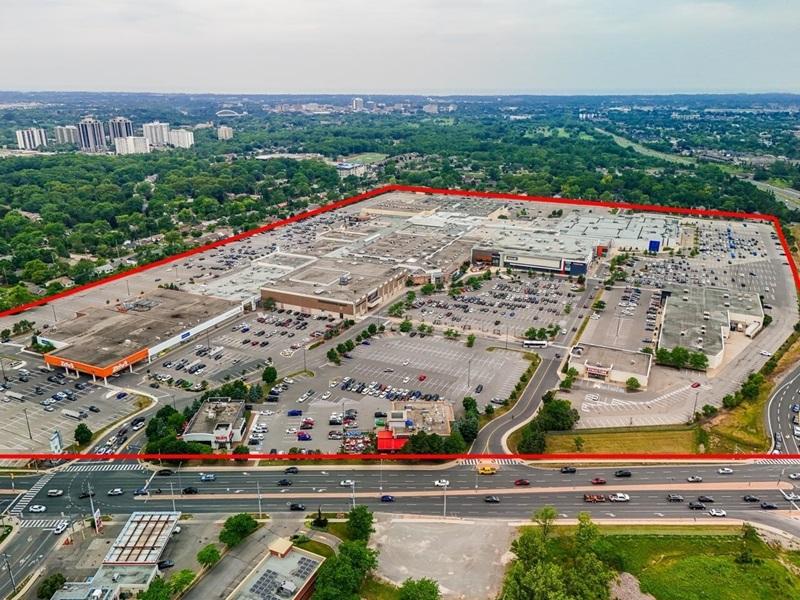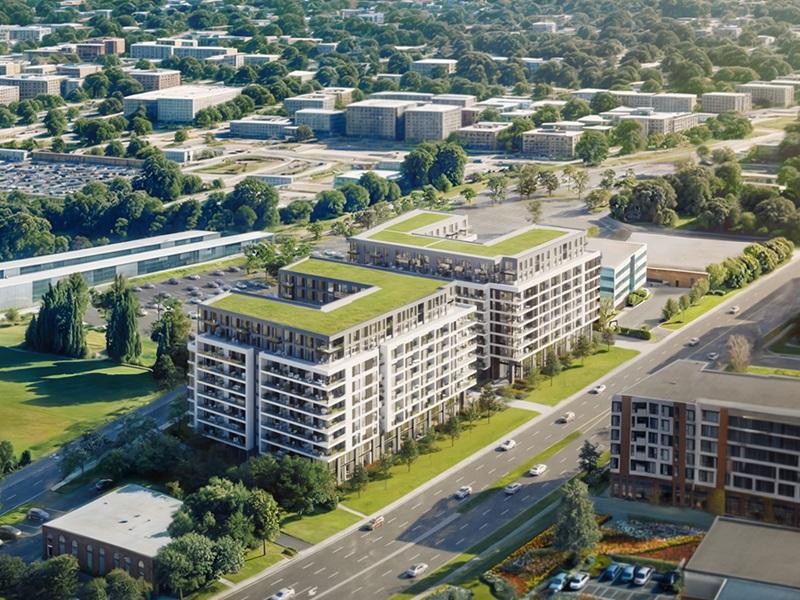
A rendering, bottom, and construction image of Skyline Commercial REIT’s industrial development at 151 Reverchon in Pointe-Claire, Que. (Courtesy Skyline Commercial REIT / Archimed Studio – Matt Delarue)
A sell-off of properties that no longer fit Skyline Commercial REIT’s investment strategy will begin winding down following major divestments the past couple of weeks in the Montreal, Ottawa and Greater Toronto areas.
The Guelph-headquartered real estate investment trust launched in 2012 and bought many smaller-bay multi-tenant industrial properties to provide diverse income sources. Over the past half-decade, however, it’s been acquiring newer product with larger tenants and better covenants.
“Adding to that, for the last three years we’ve been moving to increase our weighting in logistics, warehousing and distribution, for what are now obvious reasons,” Skyline president Michael Mackenzie told RENX.
“It just struck us that the time was right for us to make a more meaningful move to sell those assets that were not focused on that sector that we were trying to increase our weighting in.”
Skyline has divested about $297 million worth of property since Jan. 21.
Skyline’s 2021 and 2022 dispositions
Skyline sold four properties in the Montreal suburbs of Lachine and Dorval, totalling 402,709 square feet of small-bay, multi-tenant industrial space, to KingSett Real Estate Growth LP No. 7 and Candev Immobilia Inc. for $80.13 million on Jan. 21.
The privately owned REIT followed that on Jan. 24 by selling 18 small-bay industrial properties in Ottawa, totalling 24 buildings and 692,613 square feet, to Woodbourne Capital Management and Epic Investment Services LP for $154.5 million.
Skyline wasn’t done there; on the same day it also sold two industrial properties in the Greater Toronto Area (GTA) totalling 207,689 square feet to Pure Industrial for $62.8 million.
Those deals followed on the heels of four other Ontario dispositions, totalling more than 597,000 square feet and bringing in gross proceeds of $87.4 million, last year. They were:
– 5 Cochran Drive in Ayr;
– nine properties comprising London’s Newbold Business Park;
– 2410, 2460 and 2500-2510 Tedlo St, in Mississauga;
– and 2187 and 2215 Huron Church Rd. in Windsor.
It’s a good time to sell industrial assets

148 Colonnade Rd., in Ottawa is one of 18 industrial properties across the city, a total of 24 buildings, sold by Skyline Commercial REIT. (Courtesy Skyline Commercial REIT)
“These are good assets that we’re selling and they’ve served their purpose for our strategy,” said Mackenzie. “We felt that with where the market is today and how these types of assets are being valued, we thought it was the optimal time for us to take the capital we have invested in those assets and redeploy them into the type of assets that we now want to own.”
Skyline, which is operated and managed by Skyline Group Of Companies, purposefully divided the disposition portfolio and engaged different companies to bring them to market. It worked with RBC Capital Markets Real Estate Group for the Montreal properties, CBRE for the Ottawa and GTA properties, JLL for the Mississauga properties and Colliers for the London properties.
Mackenzie said there was an “extraordinary” amount of interest in the properties.
“I think part of the attraction of the small-bay product we’re selling is that the lease terms are shorter and people who are buying them can get at rents and really improve the income.”
Skyline has another sale under contract that will close soon and there may be a few additional individual property dispositions, but nothing substantial, according to Mackenzie.
“This was a fulsome strategy that we had and have pretty much completed at this point. We’ve really changed the complexion of the portfolio.”
Plans for disposition proceeds
A major portion of the proceeds will be funnelled into Skyline’s development pipeline.
“We made a decision back in 2020 that the only way we were going to be able to acquire the real estate we wanted, at a price we were prepared to pay, in locations that we wanted, was to build it,” said Mackenzie. “As much as it’s expensive today to acquire real estate, it was already feeling that way in 2020.
“We have our own development group, but it seemed to make sense to me that we should be partnering with local development partners who are on the ground, sometimes with land and sometimes without, to start creating a pipeline to bring product into the fund that would meet the demands that we saw then and that are now obvious for big e-commerce logistics and distribution requirements that have just swamped the market.
“We wanted to be at the front of the pack in terms of being able to bring forward that kind of product to the marketplace.”
Skyline’s strategy is to build and own its properties long-term.
New Skyline industrial developments
Skyline and Calgary-based Highfield Investment Group completed the development of a purpose-built 150,000-square-foot industrial space in the High Plains Industrial Park, just north of Calgary, last February.
“The benefit of strong local partnerships is sometimes you can find the right opportunities,” said Mackenzie. “We’ve developed some good partnerships and are happy to develop more.”
Skyline is also involved with six developments in the Montreal area with local partners Rosefellow and FIT Ventures under the name RF Limited Partnership I.
“We’ve seen land values double there since we started,” said Mackenzie. “When we started, Toronto land prices were already starting to skyrocket. But in Montreal there was a lag, so we were able to get in ahead of the lift.”
Montreal land prices are now quickly catching up to those around Ontario’s capital, Mackenzie pointed out.
The RF Limited Partnership I industrial developments in Quebec are:
– a two-building project that will bring more than 250,000 square feet of purpose-built logistical space to Montreal-Est when it’s completed later this quarter. It’s leased to a tenant that can’t be named yet;
– a 325,000-square-foot, purpose-built logistical space with 32-foot clear heights in suburban Pointe-Claire that’s scheduled for completion in the next few months. It’s leased for 10 years to a tenant that can’t be named yet;
– a 102,000-square-foot logistical space on the east end of the Island of Montreal that hasn’t broken ground yet but is scheduled for a 2023 delivery;
– a 270,000-square-foot, purpose-built logistical space in Pointe-Claire that hasn’t broken ground yet but is scheduled for a 2023 delivery;
– a 260,000-square-foot, purpose-built space in Mascouche, where an unnamed cold-storage logistics company has leased 220,000 square feet for 20 years. It’s scheduled for a 2023 delivery;
– and a 296,000-square-foot, purpose-built industrial space in Laval scheduled for a 2023 delivery.
Montreal development has been done speculatively to this point and Mackenzie said the strategy for future projects will be decided on a case-by-case basis.
Future acquisitions and outlook
Skyline continues to pursue both land and building acquisitions and is at different stages of review, discussions and contracts for various projects at this point, according to Mackenzie.
“We’re able to look selectively and strategically longer-term at a few things now. But it’s certainly not an easy market to make acquisitions. Our perspective is that you really have to remain disciplined.
“We’re fortunate that the nature of our fund isn’t that we have a certain amount of money that we have to deploy every year. We’re not under any pressure with a deployment period. It’s private capital. If the right deal’s not there, we’re not buying, which is a huge advantage for us right now.”
Mackenzie said the industrial sector is full of optimism at the moment due to the robust growth in property valuations and rents over the past couple of years, but it’s difficult to predict how long these upward trajectories will continue.
“I think we’re very well-positioned for whatever is to come. In particular we’re well-positioned to still find growth in a competitive market.”











